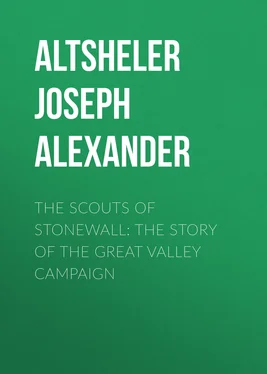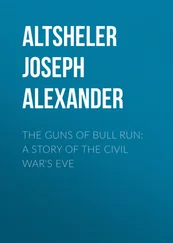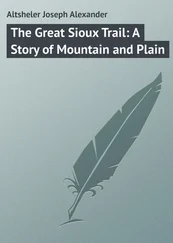Joseph Altsheler - The Scouts of Stonewall - The Story of the Great Valley Campaign
Здесь есть возможность читать онлайн «Joseph Altsheler - The Scouts of Stonewall - The Story of the Great Valley Campaign» — ознакомительный отрывок электронной книги совершенно бесплатно, а после прочтения отрывка купить полную версию. В некоторых случаях можно слушать аудио, скачать через торрент в формате fb2 и присутствует краткое содержание. Жанр: foreign_children, foreign_antique, foreign_prose, prose_military, на английском языке. Описание произведения, (предисловие) а так же отзывы посетителей доступны на портале библиотеки ЛибКат.
- Название:The Scouts of Stonewall: The Story of the Great Valley Campaign
- Автор:
- Жанр:
- Год:неизвестен
- ISBN:нет данных
- Рейтинг книги:4 / 5. Голосов: 1
-
Избранное:Добавить в избранное
- Отзывы:
-
Ваша оценка:
- 80
- 1
- 2
- 3
- 4
- 5
The Scouts of Stonewall: The Story of the Great Valley Campaign: краткое содержание, описание и аннотация
Предлагаем к чтению аннотацию, описание, краткое содержание или предисловие (зависит от того, что написал сам автор книги «The Scouts of Stonewall: The Story of the Great Valley Campaign»). Если вы не нашли необходимую информацию о книге — напишите в комментариях, мы постараемся отыскать её.
The Scouts of Stonewall: The Story of the Great Valley Campaign — читать онлайн ознакомительный отрывок
Ниже представлен текст книги, разбитый по страницам. Система сохранения места последней прочитанной страницы, позволяет с удобством читать онлайн бесплатно книгу «The Scouts of Stonewall: The Story of the Great Valley Campaign», без необходимости каждый раз заново искать на чём Вы остановились. Поставьте закладку, и сможете в любой момент перейти на страницу, на которой закончили чтение.
Интервал:
Закладка:
This forest was of much wider extent than he had supposed. It stretched northward further than he could see, and, although it was devoid of undergrowth, it was very dark among the trees. He rode his horse behind the trunk of a great oak, and, pausing there, examined all the forest within eyeshot.
He saw nothing but the long rows of tree trunks, white on the northern side with snow, and he heard nothing but the cold rustle of wind among boughs bare of branches. Yet he had full confidence in the words of Seth Moore. He could neither see him nor hear him, but he was sure that somebody besides himself was in the wood. Once more the soul and spirit of his great ancestor were poured into him, and for the moment he, too, was the wilderness rover, endowed with nerves preternaturally acute.
Hidden by the great tree trunks he listened attentively. His horse, oppressed by the cold and perhaps by the weariness of the day, was motionless and made no sound. He waited two or three minutes and then he was sure that he heard a slight noise, which he believed was made by the hoofs of a horse walking very slowly. Then he saw the shadow.
It was the dim figure of a man on horseback, moving very cautiously at some distance from Harry. He urged his own horse forward a little, and the shadow stopped instantly. Then he knew that he had been seen, and he sat motionless in the saddle for an instant or two, not knowing what to do.
After all, the man on horseback might be a friend. He might be some scout from a band of rangers, coming to join Jackson; and not yet sure that the army in the woods was his. Recovering from his indecision he rode forward a little and called:
“Who are you?”
The shadow made no reply, and horse and rider were motionless. They seemed for an instant to be phantoms, but then Harry knew that they were real. He was oppressed by a feeling of the weird and menacing. He would make the sinister figure move and his hand dropped toward his pistol belt.
“Stop, I can fire before you!” cried the figure sharply, and then Harry suddenly saw a pistol barrel gleaming across the stranger’s saddle bow.
Harry checked his hand, but he did not consider himself beaten by any means. He merely waited, wary and ready to seize his opportunity.
“I don’t want to shoot,” said the man in a clear voice, “and I won’t unless you make me. I’m no friend. I’m an enemy, that is, an official enemy, and I think it strange, Harry Kenton, almost the hand of fate, that you and I come face to face again under such circumstances.”
Harry stared, and then the light broke. Now he remembered both the voice and the figure.
“Shepard!” he exclaimed.
“It’s so. We’re engaged upon the same duty. I’ve just been inspecting the army of General Jackson, calculating its numbers, its equipment, and what it may do. Keep your hand away from that pistol. I might not hit you, but the chances are that I would. But as I said, I don’t want to shoot. It wouldn’t help our cause or me any to maim or kill you. Suppose we call it peace between us for this evening.”
“I agree to call it peace because I have to do it.”
Shepard laughed, and his laugh was not at all sarcastic or unpleasant.
“Why a rage to kill?” he said. “You and I, Harry Kenton, will find before this war is over that we’ll get quite enough of fighting in battles without seeking to make slaughter in between. Besides, having met you several times, I’ve a friendly feeling for you. Now turn and ride back to your own lines and I’ll go the other way.”
The blood sprang into Harry’s face and his heart beat hard. There was something dominating and powerful in the voice. It now had the tone of a man who spoke to one over whom he ruled. Yet he could do nothing. He saw that Shepard was alert and watchful. He felt instinctively that his foe would fire if he were forced to do so and that he would not miss. Then despite himself, he felt admiration for the man’s skill and power, and a pronounced intellectual quality that he discovered in him.
“Very well,” he replied, “I’ll turn and go back, but I want to tell you, Mr. Shepard, that while you have been estimating what General Jackson’s army can do you must make that estimate high.”
“I’ve already done so,” called Shepard—Harry was riding away as he spoke. The boy at the edge of the wood looked back, but the shadow was already gone. He rode straight across the open and Seth Moore met him.
“Did you find anything?” the young mountaineer asked.
“Yes, there was a mounted man in a blue uniform, a spy, who has been watching, but he made off. You had good eyes, Seth, and I’m going to report this at once to General Jackson.”
Harry knew that he was the bearer of an unpleasant message. General Jackson was relying upon surprise, and it would not please him to know that his movements were watched by an active and intelligent scout or spy. But the man had already shown his greatness by always insisting upon hearing the worst of everything.
He found the chief, still sitting before one of the fires and reported to him fully. Jackson listened without comment, but at the end he said to two of the brigadiers who were sitting with him:
“We march again at earliest dawn. We will not wait for the wagons.”
Then he added to Harry:
“You’ve done good service. Join the sleepers, there.”
He pointed to a group of young officers rolled in their blankets, and Harry obeyed quickly.
CHAPTER IV. WAR AND WAITING
Harry slept like one dead, but he was awakened at dawn, and he rose yet heavy with sleep and somewhat stiff from the severe exertions of the day before. But it all came back in an instant, the army, the march, and the march yet to come.
They had but a scanty breakfast, the wagons not yet having come up, and in a half hour they started again. They grumbled mightily at first, because the day was bleak beyond words, heavy with clouds, and sharp with chill. The country seemed deserted and certainly that somber air was charged with no omens of victory.
But in spite of everything the spirits of the young troops began to rise. They took a pride in this defiance of nature as well as man. They could endure cold and hunger and weariness as they would endure battle, when it came. They went on thus three days, almost without food and shelter. Higher among the hills the snow sometimes beat upon them in a hurricane, and at night the winds howled as if they had come down fresh from the Arctic.
The spirits of the young troops, after rising, fell again, and their feet dragged. Jackson, always watching, noticed it. Beckoning to several of his staff, including Harry, he rode back along the lines, giving a word of praise here and two words of rebuke there. They came at last to an entire brigade, halted by the roadside, some of the men leaning against an old rail fence.
Jackson looked at the men and his face darkened. It was his own Stonewall Brigade, the one of which he was so proud, and which he had led in person into the war. Their commander was standing beside a tree, and riding up to him he demanded fiercely:
“What is the meaning of this? Why have you stopped?”
“I ordered a stop of a little while for the men to cook their rations,” replied General Garnett.
Jackson’s face darkened yet further, and the blue eyes were menacing.
“There is no time for that,” he said sharply.
“But the men can’t go any farther without them. It’s impossible.”
“I never found anything impossible with this brigade.”
Jackson shot forth the words as if they were so many bullets, gave Garnett a scornful look and rode on. Harry followed him, as was his duty, but more slowly, and looked back. He saw a deep red flush show through Garnett’s sunburn. But the preparations for cooking were stopped abruptly. Within three minutes the Stonewall Brigade was in line again, marching resolutely over the frozen road. Garnett had recognized that the impossible was possible—at least where Jackson led.
Читать дальшеИнтервал:
Закладка:
Похожие книги на «The Scouts of Stonewall: The Story of the Great Valley Campaign»
Представляем Вашему вниманию похожие книги на «The Scouts of Stonewall: The Story of the Great Valley Campaign» списком для выбора. Мы отобрали схожую по названию и смыслу литературу в надежде предоставить читателям больше вариантов отыскать новые, интересные, ещё непрочитанные произведения.
Обсуждение, отзывы о книге «The Scouts of Stonewall: The Story of the Great Valley Campaign» и просто собственные мнения читателей. Оставьте ваши комментарии, напишите, что Вы думаете о произведении, его смысле или главных героях. Укажите что конкретно понравилось, а что нет, и почему Вы так считаете.












